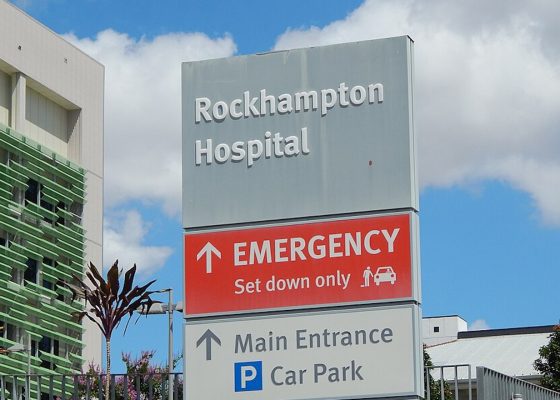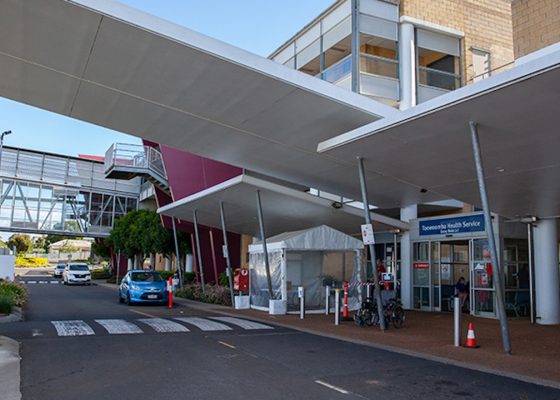Claims of patient sedation and data manipulation at two Queensland hospitals have sparked calls for an inquiry.
Frontline nurses in central Queensland have doubled down in allegations of serious systemic issues at two public hospitals.
Earlier in the week The Courier Mail reported the Nurses’ Professional Association of Queensland (NPAQ) had surveyed almost 100 nurses from the Gladstone and Rockhampton hospitals, uncovering a pattern of patient reclassification and misuse of short stay units, as well as claims that mental health patients were being sedated to manage overcrowding.
In the explosive allegations, the nurses said data was being deliberately manipulated to conceal the true extent of the hospital bed block crisis.
“This isn’t mismanagement — it appears to be deliberate concealment to protect funding,” NPAQ president Kara Thomas told the CM.
“Patients are being sedated, stashed in short stay units, and data is being gamed to avoid emergency department performance breaches. Staff are being pressured to manage optics instead of outcomes. It’s dangerous, unethical, and happening every shift.”
Ms Thomas told Health Services Daily that the core issues were:
- Patients waiting 24 hours or more in emergency, “often much longer”.
- Reports that mental health patients were left for days with no treatment except for sedation. She said almost 80% of survey respondents reported chemical restraints being used more frequently due to patient aggression or mental health crises.
- Nurses being asked to reclassify or “screen move” patients to avoid 24-hour breaches.
- Overloaded resuscitation zones, unsafe ratios, and constant census breaches.
- Bed block and patients being treated in unmonitored spaces.
“These aren’t new problems but according to feedback they’ve escalated significantly over the past year,” she told HSD.
“Our members are now saying things like ‘It feels like they’re waiting for someone to die in the waiting room before they act’.
“We’ve received multiple reports that patients are being marked as transferred into short stay before they physically move, simply to avoid a reportable breach. For example, a nurse was pressured to update the screen to reflect a short stay admission before the patient was even in the bed.
“Another said, ‘We had to move a patient on the system even though they hadn’t left resus — because we had to make space to hit the numbers’.”
The NPAQ formally request an independent inquiry from Premier David Crisafulli, Health Minister Tim Nicholls, and Queensland Health Director-General David Rosengren. It wants a full audit of emergency department (ED) reporting systems and public release of performance metrics, including mental health wait times, sedation use and adverse incident follow-up rates.
Mr Nicholls responded by attributing the crisis to the previous Labor administration, highlighting recent improvements in hospital ramping statistics.
“Under the Crisafulli government there are green shoots of improvements in key statistics like ramping numbers in Rockhampton — now at 31.6%, down from its high point under Labor at 56% in May 2023. The downward trend is also evident in Gladstone, where the latest monthly data shows ramping trending down and now at 17.2 per cent,” Mr Nicholls was quoted as saying in the CM.
Ms Thomas provided Health Services Daily with a copy of a letter she received from Queensland Health director-general Dr David Rosengren following the written request for an independent review.
“I appreciate extended stays in emergency departments (EDs) pose a significant and preventable risk to patient safety and I have shared my expectation with all Health Service Chief Executives that we work collectively to achieve a commitment that no patient will remain in an ED for more than 24 hours,” he wrote.
Related
“I do not endorse incorrect reporting of data or unsafe practices to achieve this commitment and am reassured by HSCEs that this does not occur.
“EDs have been dealing with high demand, and Queensland Health’s focus remains on getting patients safely through the ED and into the most suitable place for their care, whether that is at home or in a hospital bed.
“The Central Queensland Hospital and Health Service’s (CQHHS’s) dedicated clinicians and support staff work extremely hard to provide timely access to healthcare and I have requested the CQHHS Chief Executive work with staff to strengthen their support and safety at the frontline.”
In a statement to HSD, Central Queensland Hospital and Health Service chief executive Lisa Blackler rejected the claims of sedation of mental health patients.
“I absolutely refute the allegations that mental health patients are sedated while waiting for a bed in the inpatient unit,” she said.
“Sedation is only administered when a patient’s behaviour escalates to a point where it poses a risk to themselves, other patients, or staff. Even then, patients are placed under continuous monitoring to ensure their physical wellbeing and safety.”
Ms Blackler said EDs had been dealing with high demand, and “our focus remains on getting patients through the ED and into the most suitable place for their care, be that at home, or in a hospital bed”.
“I am concerned that allegations have been made that ED data has been misrepresented and I certainly do not endorse incorrect reporting of data in any instance,” she said.
“We recognise that Emergency Departments are not suitable for long-term care, and we have committed to reduce the number of patients spending more than 24 hours in an ED.”
She said mental health clinicians and medical officers worked closely with the ED team to ensure these patients are regularly reviewed and getting the care they need while waiting.
“Staffing is always a challenge in regional areas, and to support recruitment of nursing staff we have launched a centralised campaign to focus on vacancies across all of our facilities and have recently partnered with nearby local councils to drive recruitment efforts,” she said.
She said master planning was underway in Rockhampton, Gladstone and the Capricorn Coast to ensure healthcare infrastructure was “future-ready, sustainable and provides contemporary care to the community”.
The NPAQ is standing firm on its allegations and its demand for an inquiry. In a letter seen by HSD sent to Minister Nicholls and Dr Rosengren and signed by Ms Thomas, the association described their response as “profoundly disappointing”.
“Despite stating that staff and patient safety are priorities, your response offers generic reassurances while avoiding accountability and failing to address the legitimate safety concerns raised by frontline health workers,” Ms Thomas wrote.
“These are not unsubstantiated allegations; they are documented, comprehensive findings and are now in the public domain.
“To dismiss these documented realities with a single sentence stating you do not ‘endorse incorrect reporting’ and are ‘reassured’ that it’s not occurring, despite extensive and detailed evidence, is a gross failure of fundamental leadership.”
She said the response risked “insulting and further demoralising the workforce”.
“These are not media stunts. These are pleas for intervention,” Ms Thomas wrote.
“Your obligations and responsibility is not to defend executive reputations, it is to protect patients and staff from preventable harm. Should you refuse to fulfil these responsibilities and exercise your duty, we will continue to escalate this publicly and politically until meaningful action is taken.”
Ms Thomas told HSD the association respected Ms Blackler’s right to respond to their allegations, “but her denial doesn’t align with what frontline staff are reporting, and it risks undermining the credibility of those who’ve spoken out at real professional risk”.
“If Ms Blackler refutes these practices, she should back it up by authorising a protected, independent, anonymous staff survey. Anything less is an attempt to manage optics, not fix problems,” she said.
She said members were “relieved that the truth is finally being exposed, and hopeful it will lead to meaningful change”.
“But being effectively silenced under government gag orders does create a degree of fear,” she said.
“For many, though, the conditions have pushed them to breaking point, speaking out anonymously has become the only option.”




